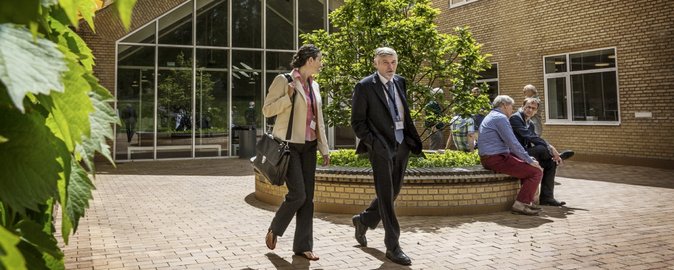- Education
-
Research
Current research
Talent
-
Collaboration
Businesses
Government agencies and institutions
Alumni
-
About AU
Organisation
Job at AU
The Centre for Healthcare Cooperation at Aarhus University opens on 27 October with the clear objective of maintaining and improving Denmark's leading position in the field of innovative health and technological welfare solutions – on the basis of research and with dialogue and collaboration in focus.
2015.10.19 |

The Centre for Healthcare Cooperation is housed in the AIAS building on Høegh-Guldbergs Gade in Aarhus. Photo: AU.
Innovation, knowledge and growth will be the core concepts when the new Centre for Healthcare Cooperation at Aarhus University, Health, officially opens and begins to work towards improving and easing life for those Danes who, in one way or another, have come into contact with illness, health and welfare.
"Our society is currently experiencing major challenges in the areas of health and welfare. For example, we see a growing number of young people who are not thriving. Or we could take the rising medicine prices, or the fact that the duration of chronic diseases is currently increasing in Denmark. Those challenges are not being solved well enough today and this is the background for starting the new centre," says the Director of the Centre for Healthcare Cooperation, Professor Carsten Obel, Aarhus University.
The opening conference takes place on 27 October with two main issues in focus.
According to the Centre for Healthcare Cooperation, the answers must be found through cooperation and collaboration across traditional sectors and disciplines. This is the reason why Innovation Fund Denmark, the Central Denmark Region, Aarhus Municipality and Aarhus University are all represented at the opening conference:
"Across the Danish municipalities and regions a wide range of pilot projects are being initiated to make life better for our citizens and to make savings in public sector budgets. Many of them are good projects.”
"But there is often a lack of research-based evidence to show that the products can be commercialised, which makes it difficult for companies to scale their products to the national and international market. We have a unique opportunity to exploit Denmark's potential as a test market and to create new innovation in the area, but for us to succeed in doing this, we need the key players to work closely together," says Carsten Obel.
He adds that patients and others will, as a natural consequence of this, also be involved in the development of new knowledge, for example in connection with the development of technological solutions that support coherent pathways in the healthcare system.
The work of the Centre itself always takes its starting point in research-based knowledge and collaboration with the environments across Aarhus University's faculties and departments, as well as with other universities in Denmark and abroad.
Director, Professor Carsten Obel
Aarhus University, Health, Centre for Healthcare Cooperation
Mobile: (+45) 2942 8405